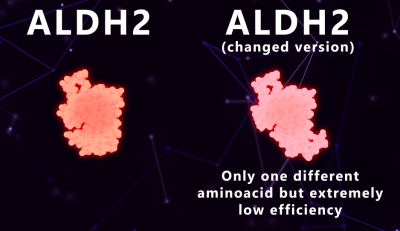
Hi Steemians!
The other day I was making a video for my educational youtube channel about addictions. My previous posts was partially about addictions, how it changes our brains and how environment can shape our inclination to drugs. But there is one more factor I did not mention – genetics.
There is a huge conversation: What contributes more to the development of addiction? Is it your environment or your genes? What I got from my personal research using mighty Internet – both. And it is really highly variable from individual to individual. There are around 20 000 genes with various functions and many of them acts differently depending on actual enviroment. But I found one example of a gene that can influence the propability of alcohol addiction to quite a big degreee. The gene is called ALDH2 - a gene involved in alcohol metabolism.
What makes you sick when drinking?
Actually, when you drink, ethanol is not the primary cause of your headache, dizziness and feeling sick. When you drink ethanol, your body converts it to acetaldehyde – a toxic substance. Acetaldehyde is responsible for all the sickness and hangover. And of course, since acetaldehyde is toxic, it needs to be further converted to another substance called acetate. The latter conversion is done by an enzyme coded by the above mention ALDH2 gene.

Change that matters
But there is a plot twist – not all people have the same efficient ALDH2 enzyme. Some of us have a version of ALDH2 with one changed aminoacid. This single change leads to an enzyme that has extremly reduced efficiency of acetaldehyde conversion. That means that in your body acumulates acetaldehyde and it lasts far longer untill your body gets rid of it. In other words – when you drink you get sick really fast.

It turned out that people with this version of ALDH2 have lower propability to develop addiction. The reason? Since they get sick quite fast, they never drink it in excess and they just simply do not enjoy it.
And that is my friends one example how your genes can shape your tendency for becoming an addict.

References: https://www.ncbi.nlm.nih.gov/pmc/articles/PMC3860432/
Genes and propability of becoming an addict
sigh... I checked everything 5454845x, but missed a headline :D
I was reffering to its duplicity :)